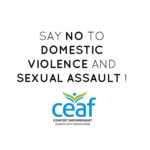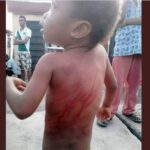On this fifth day of the #16DaysOfActivism Against Gender-Based Violence, the Comfort Empowerment and Advocacy Foundation (CEAF) stands in solidarity with Nigeria’s third sector and global stakeholders to demand urgent action from the government to protect the girl child. Girls in Nigeria face alarming challenges, from gender-based violence and discrimination to systemic neglect that stifles their potential and puts their futures at risk.
Today, we declare: “Give the Girl Child a Chance to Thrive!”
This is not just a slogan but a call to action for all Nigerians to recognize the girl child as a beacon of hope and progress. Her protection, education, and empowerment are not optional—they are essential for building a safe, equitable, and prosperous society.
The Plight of the Nigerian Girl Child
In Nigeria, the girl child faces a myriad of challenges that threaten her safety, health, and potential. From harmful cultural practices to gender inequality deeply ingrained in societal norms, girls often find themselves at the mercy of systems and traditions that fail to value them as equal members of society.
• Child Marriage
According to UNICEF, 43% of girls in Nigeria are married before their 18th birthday, and 16% are married before turning 15. Child marriage robs young girls of their childhood, education, and autonomy. Many of these girls face domestic violence, early pregnancies, and severe health complications due to childbirth at an early age.
• Education Barriers
Nigeria has one of the highest numbers of out-of-school children in the world, with girls disproportionately affected. Cultural biases, poverty, and safety concerns often lead families to prioritize boys’ education over girls’. This perpetuates a cycle of illiteracy, economic dependency, and vulnerability.
• Gender-Based Violence
The prevalence of sexual violence against girls in Nigeria is alarming. A report by UNICEF revealed that 1 in 4 girls experience sexual violence before the age of 18. Fear of stigma, lack of access to justice, and societal silence often prevent survivors from speaking out or seeking help.
• Harmful Traditional Practices
Practices such as female genital mutilation (FGM) continue to affect millions of girls in Nigeria, despite laws banning it. FGM not only causes physical and psychological harm but also reinforces the notion that a girl’s body is not her own.
The Call for Government Action
As advocates for the protection and empowerment of the girl child, CEAF joins the global call for the Nigerian government to take the following urgent actions:
• Enforce Laws Against Child Marriage and FGM
While Nigeria has laws prohibiting child marriage and FGM, enforcement remains weak. The government must ensure that violators are held accountable and that affected communities are educated about the harm these practices cause.
• Invest in Girls’ Education
Education is a powerful tool for breaking the cycle of poverty and inequality. The government must increase funding for education, provide safe school environments, and create policies that encourage families to prioritize girls’ education.
• Strengthen Justice Systems
Survivors of gender-based violence must have access to justice and support services. This includes creating specialized units within law enforcement to handle cases involving girls and ensuring that perpetrators are prosecuted.
• Empower Grassroots Organizations
NGOs like CEAF are on the frontlines, working directly with communities to protect and empower girls. The government must partner with and fund such organizations to amplify their impact.
Case Studies: The Stories of Nigerian Girls
1. Mariam’s Escape from Child Marriage
Mariam, a 14-year-old girl from northern Nigeria, was set to be married to a man three times her age. Through the intervention of a local NGO, she was rescued and enrolled in a school supported by CEAF. Today, Mariam is thriving academically and dreams of becoming a doctor. Her story is a testament to the transformative power of education and advocacy.
2. Amina’s Battle Against FGM
Amina, a 12-year-old girl from a rural community in Nigeria, was saved from undergoing FGM after her mother learned about its dangers during a CEAF outreach program. Amina now advocates for girls in her community, using her voice to educate others about the importance of protecting the girl child.
3. The School Outreach Impact
During a recent CEAF school session on sexual awareness and prevention, we interacted with girls who had little knowledge about their rights or the support available to them. Many shared experiences of harassment and abuse. The session empowered them with information and the courage to seek help, showing the importance of continuous education and community engagement.
Why Protecting the Girl Child Matters
The well-being of the girl child is directly tied to the well-being of society as a whole. When girls are educated, healthy, and empowered, they contribute significantly to economic growth, social stability, and the overall development of their communities.
• Economic Growth
Educated girls are more likely to secure better-paying jobs, invest in their families, and contribute to national development. Studies show that closing gender gaps in education and employment could add billions to Nigeria’s GDP.
• Healthier Families
Girls who are educated and empowered are more likely to make informed decisions about their health and the health of their families, leading to lower maternal and child mortality rates.
• Breaking Cycles of Violence
Protecting and empowering girls helps break the intergenerational cycle of violence and poverty, creating a safer and more equitable society for future generations.
CEAF’s Role in Protecting the Girl Child
At CEAF, we are deeply committed to protecting the girl child and ensuring she has the tools and opportunities to thrive. Our initiatives include:
• Community Outreach Programs: Educating families about the dangers of child marriage, FGM, and other harmful practices.
• School-Based Sessions: Teaching students about sexual awareness, consent, and prevention of abuse.
• Safe House Project: Building a safe space for survivors of gender-based violence to heal and rebuild their lives.
• Advocacy Campaigns: Partnering with other organizations to push for stronger laws and policies that protect girls.
A Call to Action
On this fifth day of the #16DaysOfActivism, CEAF urges all stakeholders—governments, communities, families, and individuals—to stand up for the girl child. Protecting her is not just a moral obligation; it is an investment in our collective future.
• To policymakers: Strengthen and enforce laws that protect girls from violence and discrimination.
• To communities: Challenge harmful norms and practices that devalue the girl child.
• To families: Support and prioritize the education and well-being of your daughters.
• To individuals: Use your voice, resources, and influence to advocate for the rights of the girl child.
Let us remember: every girl has the right to live a life free from violence, discrimination, and fear. By giving her the chance to thrive, we are building a society that is safe, equitable, and full of promise for everyone.
Together, we can ensure that the girl child breathes, thrives, and shines!




0 Comments